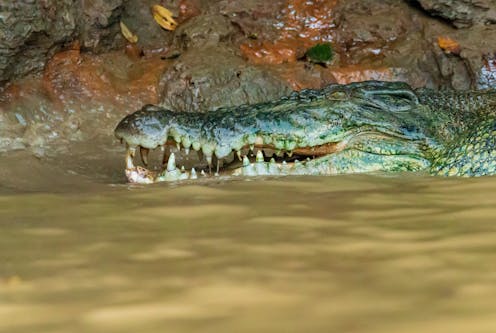Your smartphone might be linked to crocodile attacks in Indonesia. Here’s how
- Written by Brandon Michael Sideleau, PhD student studying human-saltwater crocodile conflict, Charles Darwin University

What’s the connection between your smartphone and crocodile attacks? It’s quite straightforward.
Smartphones need tin, which is often mined illegally in Indonesia. When illegal tin mines are abandoned, they fill with water. Crocodiles enter from nearby waterways, looking for food, as fishing and other human pressures have made prey short. Croc attacks increase.
That’s the short version. Here’s the longer one.
After intense culling in Indonesia in the 20th century, saltwater crocodiles (Crocodylus porosus) are now returning to islands such as Bali and Java[1]. Croc attacks have become a serious issue. Over 1,000 attacks have taken place[2] in the ten years to 2023, leading to 486 deaths.
But these attacks aren’t distributed evenly. Croc hotspots include the Bangka-Belitung islands, off the southeastern coast of Sumatra. And these islands have a huge amount of tin.
The islands of tin
The Bangka-Belitung province consists of two large namesake islands, as well as hundreds of smaller islands. About 1.5 million people live here[4]. Tin is the mainstay of the economy.
Tin is vital to smartphone production, as it is used to solder different components together. Indonesia is second only to China in tin production, producing roughly a third of the world supply. And within Indonesia, almost all[5] the tin – 90% – comes from the Bangka-Belitung islands.
During the authoritarian Suharto government, tin mining here was controlled by the central government. After Indonesia democratised in 1998, the regional government of Bangka-Belitung gained control of tin. In 2001, the government allowed its citizens the right to mine tin. Illegal tin mines ballooned as a result, increasing four-fold[6] in just three years after the laws passed.
Two decades later, illegal tin-mining has now destroyed much of the province’s biodiversity[7], particularly fish populations. It’s dangerous work for humans – around 150 miners die each year due to accidents, including crocodile attacks. Miners have also encroached[8] into crocodile habitat such as mangroves.
Tin mining makes the landscape look like the moon. Native animals flee or die. Mud pollutes waterways. Fish numbers dwindle. And crocodiles get hungrier. They start looking for different prey[9]. Dogs. Cows. Humans.
Desperate humans, desperate crocodiles
Illegal tin mining brings crocodiles closer to humans by creating new habitat, though of poor quality. After miners dig out the tin ore by hand, the craters left behind fill with water, creating pools known as “kulongs[10]”.
These kulongs are often found close enough to waterways that fish and other prey animals can end up living in them after a flood. These mining pools go much further inland than natural waterways on the islands do, allowing salties to reach far further inland. Hungry crocodiles come for the fish, but might go after a dog or human.
It’s not only mining – the felling of forests and planting of oil palms often comes with the creation of drainage canals. These canals make it easier for crocs to get close to areas where workers might be swimming or fishing.
All of this means the sharp increase in croc attacks was almost inevitable. Destroying habitat while mining in or near waterways means crocodiles found it easier and easier to be near humans.
Over the 10 years to 2023, almost 100 crocodile attacks were reported on these islands, and 41 people died. Of these attacks, almost a third (32%) were in current or former tin mines, and one sixth (16.5%) were mining at the time.
By contrast, over that same decade in Queensland, there were just five[12] fatal attacks and 14 non-fatal.
As Langka Sani, the founder of local wildlife conservation group Alobi Foundation[13] has said[14]:
In the past, we might never hear of a crocodile attack in a year, whereas now in the last two weeks there have been dozens of reports of crocodile cases.
His organisation has taken in dozens of crocodiles attacked by people as reprisals for croc attacks. Some of these are being resettled.
Reducing croc attacks will mean ending illegal tin-mining. Is that possible? Yes, but it’s unlikely. The state-owned tin mining company, PT Timah, provides miners with safer working conditions. But they cannot compete with the extra income[15] from illegal mining.
That means for the foreseeable future, the world’s demand for tin for smartphones will have a deadly cost.
Read more: Saltwater crocodiles are slowly returning to Bali and Java. Can we learn to live alongside them?[16]
References
- ^ Bali and Java (theconversation.com)
- ^ taken place (crocattack.org)
- ^ Sony Herdiana/Shutterstock (www.shutterstock.com)
- ^ live here (babel.bps.go.id)
- ^ almost all (www.thejakartapost.com)
- ^ increasing four-fold (www.jstage.jst.go.jp)
- ^ province’s biodiversity (www.mineclosure.net)
- ^ also encroached (www.bbc.com)
- ^ different prey (www.researchgate.net)
- ^ kulongs (earthjournalism.net)
- ^ CC BY (creativecommons.org)
- ^ just five (www.des.qld.gov.au)
- ^ Alobi Foundation (alobi.org)
- ^ said (earthjournalism.net)
- ^ extra income (earthjournalism.net)
- ^ Saltwater crocodiles are slowly returning to Bali and Java. Can we learn to live alongside them? (theconversation.com)

















